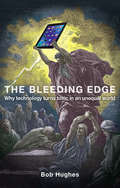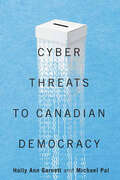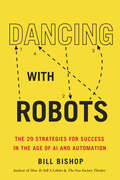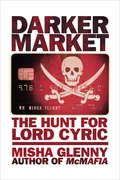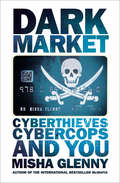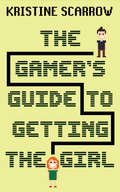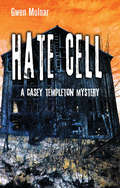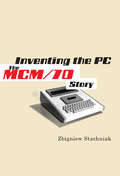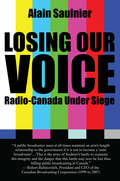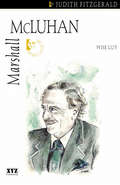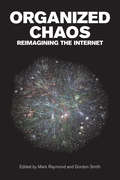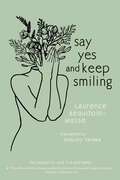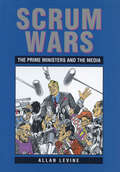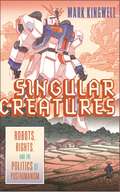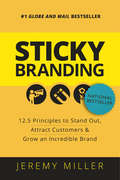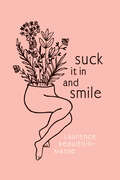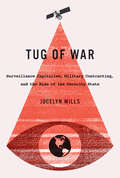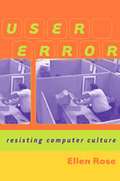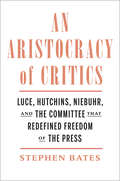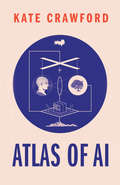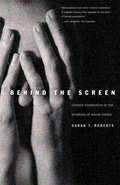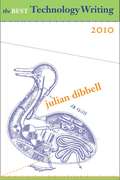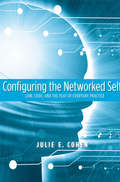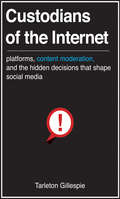- Table View
- List View
The Bleeding Edge: Why Technology Turns Toxic in an Unequal World
by Bob HughesIt’s hammered into us from birth that ‘all good things come at a price’. Today, that price looks apocalyptic, with wars, exploitation and environmental collapse in every part of the globe. Some suggest that the carnage is “a price worth paying” for technological progress. No pain, no gain. But technology is precisely the business of minimising the costs and impacts of existence… and by whole orders of magnitude. By now, all human beings should be leading creative, leisure-filled lives in a pristine world of burgeoning diversity. So how did it go so wrong? In a word, inequality. In The Bleeding Edge, Bob Hughes argues that unequal societies are incapable of using new technologies well. Wherever elites exist, self-preservation decrees that they must take control of new technologies to protect and entrench their status, rather than satisfy people’s needs. Hughes pursues the latest discoveries about the effects of social inequality on human health, into the field of human environmental impact, and traces today’s ecological crisis back to the rise of the world’s first elites, 5,000 years ago. He argues that new technologies have never emerged from elites or from the clash of competitive forces, but from largely voluntary, egalitarian collaborations of the kind that produced the world’s first working computers. Finally, Hughes shows that an egalitarian world is not ‘pie in the sky' but our evolutionary homeland, the glue that holds societies together, and the “cradle of invention” from which all our best ideas emerge. The book concludes: ‘Let’s assume that the commitment to human equality that’s written into the Universal Declaration of Human Rights means exactly what it says, and take it from there.’
Cyber-Threats to Canadian Democracy (McGill-Queen's/Brian Mulroney Institute of Government Studies in Leadership, Public Policy, and Governance)
by Holly Ann Garnett and Michael PalFrom the Cambridge Analytica scandal to overloaded internet voting servers to faulty voting machines, the growing relationship between democracy and technology has brought to light the challenges associated with integrating new digital tools into the electoral system. Canadian politics has also felt the impact of this migration online.This timely book presents the first comprehensive study of the various cyber-threats to election integrity across Canadian jurisdictions. Scrutinizing the events of the 2019 federal election, Cyber-Threats to Canadian Democracy examines how new technologies have affected the practice of electoral politics and what we can do to strengthen future Canadian elections. Through the disciplines of political science, law, computer science, engineering, communications, and others, chapters shed light on some of the most contentious issues around technology and electoral integrity. The contributors address current domestic and foreign threats to Canadian elections, evaluate the behaviour of actors ranging from political parties and interest groups to policymakers and election administrators, and assess emerging legal and regulatory responses while anticipating future challenges to the quality of elections in Canada and around the globe.Cyber-Threats to Canadian Democracy helps seed the study of digital technology’s security risks, providing insight into what reforms are needed and evaluating existing legal and policy frameworks in light of these threats.
Dancing With Robots: The 29 Strategies for Success In the Age of AI and Automation
by Bill BishopSurvive and thrive in a world being taken over by robots and other advanced technology. Artificial intelligence, machine learning, algorithms, blockchains, the Internet of Things, big data analytics, 5G networks, self-driving cars, robotics, 3D printing. In the coming years, these technologies, and others to follow, will have a profound and dramatically disruptive impact on how we work and live. Whether we like it or not, we need to develop a good working relationship with these technologies. We need to know how to “dance” with robots. In Dancing with Robots, futurist, entrepreneur, and innovation coach Bill Bishop describes 29 strategies for success in the New Economy. These new strategies represent a bold, exciting, unexpected, and radically different road map for future success.Bishop also explains how our Five Human Superpowers — embodied pattern recognition, unbridled curiosity, purpose-driven ideation, ethical framing, and metaphoric communication — give us a competitive edge over robots and other advanced technology in a world being taken over by automation and AI.
DarkerMarket: The Hunt for Lord Cyric
by Misha GlennyDarkerMarket, the special e-book extra that is the perfect companion to Misha Glenny's DarkMarket, follows the trail of Lord Cyric, the elusive cyber criminal suspected to be living in Canada. In doing so, Glenny unveils some of his investigative methods, explores new lines of inquiry and tries to untangle the web at the black heart of the Internet. This e-book extra delves further into the most compelling crime story of the year. For the full version, as well as further details on cyber criminals and how to protect yourself, read DarkMarket: CyberThieves, CyberCops and You.
DarkMarket: CyberThieves, CyberCops and You
by Misha GlennyShortlisted for the Orwell Prize and the CWA Gold Dagger for Non-Fiction Award The benefits of living in a digital, globalised society are enormous; so too are the dangers. The world has become a law enforcer's nightmare and every criminal's dream. We bank online, shop online, date, learn, work and live online. But have the institutions that keep us safe on the streets learned to protect us in the burgeoning digital world? Have we become complacent about our personal security -- sharing our thoughts, beliefs and the details of our daily lives with anyone who cares to relieve us of them? In this fascinating and compelling book, Misha Glenny, author of the international bestseller McMafia, explores the three fundamental threats facing us in the twenty-first century: cyber crime, cyber warfare and cyber industrial espionage. Governments and the private sector are losing billions of dollars each year, fighting an ever-morphing, often invisible, and highly intelligent new breed of criminal: the hacker. Glenny has travelled and trawled the world. And by exploring the rise and fall of the criminal website, DarkMarket, he has uncovered the most vivid, alarming and illuminating stories. Whether JiLsi or Matrix, Iceman, Master Splynter or Lord Cyric; whether Detective Sergeant Chris Dawson in Bolton or Agent Keith Mularski in Pittsburgh, Glenny has tracked down and interviewed all the players -- the criminals, the geeks, the police, the security experts and the victims -- and he places everyone and everything in a rich brew of politics, economics and history. The result is simply unputdownable. DarkMarket is authoritative and completely engrossing. It's a must-read for everyone who uses a computer: the essential crime book for our times.
The Gamer's Guide to Getting the Girl
by Kristine ScarrowStrategy is everything when it comes to gaming — and girls. Zach is used to living in a world of legendary battles, epic journeys, and life-or-death situations. As a gamer, he is hard-wired for adventure, even though it’s from the comfort of his parents’ couch. But nothing has prepared him for battling the biggest storm in Saskatchewan’s history while trapped in the local mall. On top of everything, Zach has finally met the girl of his dreams, but he finds himself helping everyone else stay safe while his best friend spends time with her. What Zach doesn’t realize is that love always finds its way when you’ve found the right person and are ready to risk it all to save the day.
Hate Cell: A Casey Templeton Mystery
by Gwen MolnarThirteen-year-old Casey Templeton has recently moved with his family to the southeastern Alberta town of Richford. One night Casey seeks refuge from a snowstorm in an abandoned farmhouse and stumbles upon his nearly frozen, unconscious science teacher, Mr. Deverell. Casey attempts to revive his teacher and searches the house for something to make a fire with. In the attic he makes a frightening discovery – a sophisticated office filled with computers, a printer, and racist posters and flyers! Richford is harbouring a vicious cell of white racists who are targeting everyone they deem "alien." Somehow Mr. Deverell is connected to the dangerous organization, and so, too, are other residents, young and old, in Casey’s new town. Soon the RCMP and Casey’s hacker brother, Hank, get involved in the mystery, but it’s Casey who leads the investigation into a warped world where hate is marketed on the Internet and innocent people are preyed on by bigots and bullies blinkered by their own prejudices.
Inventing the PC: The MCM/70 Story
by Zbigniew StachniakInventing the PC details the invention and design of the MCM/70 computer and the prolonged struggle to bring it to market. Zbigniew Stachniak offers an insider's view of events on the front lines of pioneering work on personal computers. He shows what information and options PC pioneers had, how well they understood what they were doing, and how that understanding - or lack thereof - shaped both their engineering ingenuity and the indecisiveness and over-reaching ambition that would ultimately turn a very promising venture into a missed opportunity. Providing comprehensive historical background and rich photographic documentation, Inventing the PC tells the story of a Canadian company on the cutting-edge of the information age.
Look It Up!: What Patients, Doctors, Nurses, and Pharmacists Need to Know about the Internet and Primary Health Care
by Julie Barlow Pierre Pluye Roland GradDoctors Pierre Pluye and Roland Grad, internationally recognized experts in the fields of knowledge translation and health information studies, along with bestselling author and journalist Julie Barlow, take readers behind the scenes to show how online information is affecting self-care and primary health care in medicine, nursing, and pharmacy. Based on fifteen years of in-depth interviews and research, Look It Up! provides essential tips for patients and clinicians to administer and receive the best possible primary health care, while avoiding the perils of unguided self-diagnosis. This book shows how, by dint of an inquiring mind and a smartphone, rapid and accurate acquisition of knowledge keeps primary care clinicians up to date. It also shows how people can determine whether a test is more beneficial than harmful, and how information helps resolve disagreements and improve collaboration with patients and families, and among doctors, pharmacists, and nurses. In the age of easily accessible online information, clinicians have to think differently about how they work. Organized around numerous real clinical stories, Look It Up! is an illuminating and lively guide to improving patient care.
Losing Our Voice: Radio-Canada Under Siege
by Alain Saulnier Pauline CoutureThe inside story of decades of government interference in the work of our national public broadcaster, CBC/Radio-Canada. Is there a quiet campaign to hamstring and silence the CBC? In Losing Our Voice Alain Saulnier, long-time head of news and public affairs at Radio-Canada, documents the decades of political interference that have jeopardized the very existence of one of Canada’s most important cultural institutions. For French-speaking Canadians, with limited options in their own language, the national broadcaster is all the more important. But tensions surrounding national unity and identity have exacerbated the tendency of federal politicians to meddle in CBC/Radio-Canada’s content and management. Saulnier takes us behind the scenes as these tensions play out, and culminate in the punitive Harper budget cuts.
Marshall McLuhan
by Judith FitzgeraldCommunications theorist Marshall McLuhan (1911-1980) predicted the effects of electronic media on modern culture as early as 1964. McLuhan published several breakthrough books and coined terms like "hot" and "cool" media, "the global village," and "the medium is the message."
Organized Chaos: Reimagining the Internet
by Mark Raymond and Gordon SmithThe Internet is constantly evolving, and has economic, political and social importance as a public good. A coherent strategy for Internet governance is needed to ensure that difficult tradeoffs between competing interests, as well as between distinct public values, are managed in a consistent, transparent and accountable manner that accurately reflects public priorities. In Organized Chaos: Reimagining the Internet, edited by Mark Raymond and Gordon Smith, leading experts address a range of pressing challenges, including cyber security issues and civil society hacktivism by groups such as Anonymous, and consider the international political implications of some of the most likely Internet governance scenarios in the 2015–2020 time frame. Together, the chapters in this volume provide a clear sense of the critical problems facing efforts to update and redefine Internet governance, the appropriate modalities for doing so, and the costs and benefits associated with the most plausible outcomes. This foundation provides the basis for the development of the research-based, high-level strategic vision required to successfully navigate a complex, shifting and uncertain governance environment.
Say Yes and Keep Smiling
by Laurence Beaudoin-MasseIn the highly anticipated sequel to Suck it In and Smile, Ellie is wrestling her picture-perfect life as a social media influencer back under control — but how long can she keep bridging the distance between the desire to be herself and the pressure to conform? Ellie is an inspiration to her hundreds of thousands of followers on Instagram and YouTube. Her book of wellness tips (including her signature recipe for chocolate chip–chickpea cookies) is about to launch. She is one half of a social-media power couple with singer Samuel Vanasse, who is now her fiancé. And she is on the verge of breaking into the top three on the YouTube charts. She has everything she needs to be happy — but lately, when she starts crying, she can’t seem to stop. Between her father’s failing health and the charming yet enigmatic Dave, between her friendship-rivalry with another YouTuber and the pressure to be “authentic” at all times, Ellie is lost. She retreats into her old patterns and tries to regain control of her life, one Fat Burning Challenge at a time. But listening to her heart isn’t as easy — or glamorous — as she’s been making it look to her followers. This exciting conclusion to Ellie’s story examines how we measure success and happiness, while exploring the complexities of body image, female rivalry and grief. Key Text Features chapters vignettes dialogue
Scrum Wars: The Prime Ministers and the Media
by Allan LevineThe image of the scrum – a beleaguered politican surrounded by jockeying reporters – is central to our perception of Ottawa. The modern scrum began with the arrival of television, but even in Sir John A. Macdonald’s day, a century earlier, reporters in the parliamentary press gallery had waited outside the prime minister’s office, pen in hand, hoping for a quote for the next edition. The scrum represents the test of wills, the contest of wits, and the battle for control that have characterized the relationship between Canadian prime ministers and journalists for more than 125 years. Scrum Wars chronicles this relationship. It is an anecdotal as well as analytical account, showing how earlier prime ministers like Sir John A. Macdonald and Sir Wilfrid Laurier were able to exercise control over what was written about their administrators, while more recent leaders like John Diefenbaker, Joe Clark, John Turner, and Brian Mulroney often found themselves at the mercy of intense media scrutiny and comment.
Singular Creatures: Robots, Rights, and the Politics of Posthumanism
by Mark KingwellAnxiety about non-human intelligent machines is a longstanding theme of cultural production and consumption. Examples range from tales of golems and Frankenstein’s monster to the evil overlord scenarios of contemporary film and television franchises: Star Trek, the Alien series, and the Terminator sequence, as well as Her, Black Mirror, Blade Runner, Ex Machina, and many other less mainstream cultural artifacts. The source of this anxiety is clear. Non-human conscious entities may turn out to be superior to any biological form of life, allowing a stride across human ambition in a moment dubbed “the Singularity” by AI insiders. This is the turning point when non-human entities advance and reproduce in a manner that surpasses and subjugates biological forms of intelligent life. Although today’s artificial intelligences fall notably short of this level of sophistication, Mark Kingwell argues that we are already more than human in important ways, and likely to become more so as time goes on. In Singular Creatures Kingwell plumbs the depths of cultural and political meaning in the apparent transition to posthuman life. Our immersion in technology, now comprehensive to the point of invisibility, has altered forever what it means to be alive. The politics of posthumanism flow directly from our own situation, at once dependent on technology and afraid of its effects on current and future experiences.More than a century after playwright Karel Čapek coined the word robot – rooted in the Czech robota, meaning “servitude” or “drudgery” – in his 1920 allegory about the alienation of forced labour leading to a violent workers’ revolt, Čapek’s central question continues to haunt us. Can humans and their own creations co-exist in a new cyberflesh world, or is a struggle for superiority inevitable? Singular Creatures is an attempt at sketching the field before any deadly battle is joined.
Sticky Branding: 12.5 Principles to Stand Out, Attract Customers, and Grow an Incredible Brand
by Jeremy Miller#1 Globe and Mail Bestseller 2016 Small Business Book Awards — Nominated, Marketing category Sticky Brands exist in almost every industry. Companies like Apple, Nike, and Starbucks have made themselves as recognizable as they are successful. But large companies are not the only ones who can stand out. Any business willing to challenge industry norms and find innovative ways to serve its customers can grow into a Sticky Brand. Based on a decade of research into what makes companies successful, Sticky Branding is your branding playbook. It provides ideas, stories, and exercises that will make your company stand out, attract customers, and grow into an incredible brand. Sticky Branding’s 12.5 guiding principles are drawn from hundreds of interviews with CEOs and business owners who have excelled within their industries.
Suck It In and Smile
by Laurence Beaudoin-MasseA funny, touching look at the life of a social media influencer who starts to question the #goals life she has created for herself. Every day, Ellie motivates her hundreds of thousands of followers to become the best versions of themselves by posting videos of exercise routines and high-protein breakfast recipes. Far from the shy teenager that she was, she is now in a very public relationship with singer Samuel Vanasse, and together they have become one of the most popular influencer couples in the country. She has succeeded. She shines. And yet, Ellie worries that her life is not as flawless as she makes it seem on YouTube and Instagram. Between her obsession with the “ideal weight,” her growing attraction to another man, her family’s disdain for her career as a content creator and a collaboration with another influencer who Ellie can’t stand, a thought haunts her. What if, by trying to become everything she wanted to be, she’s lost herself along the way? Suck it In and Smile is an intimate exploration of our obsession with appearances and the hypocrisies that appear when you must craft the perfect online life. Key Text Features chapters vignettes dialogue
Tug of War: Surveillance Capitalism, Military Contracting, and the Rise of the Security State (Carleton Library Series #242)
by Jocelyn WillsSelling Earth observation satellites on their abilities to predict and limit adverse environmental change, politicians, business leaders, the media, and technology enthusiasts have spent sixty years arguing that space exploration can create a more peaceful, prosperous world. Capitalist states have also socialized the risk and privatized the profits of the commercial space industry by convincing taxpayers to fund surveillance technologies as necessary components of sovereignty, freedom, and democracy. Jocelyn Wills’s Tug of War reminds us that colonizing the cosmos has not only accelerated the arms race but also encouraged government contractors to compete for the military and commercial spoils of surveillance. Although Canadians prefer to celebrate their role as purveyors of peaceful space applications, Canada has played a pivotal part in the expansion of neoliberal policies and surveillance networks that now encircle the globe, primarily as a political ally of the United States and component supplier for its military-industrial complex. Tracing the forty-five-year history of Canada’s largest space company – MacDonald, Dettwiler and Associates (MDA) – through the lens of surveillance studies and a trove of oral history transcripts, government documents, trade journals, and other sources, Wills places capitalism’s imperial ambitions squarely at the centre of Canada-US relations and the privatization of the Canadian political economy. Tug of War confronts the mythic lure of technological progress and the ways in which those who profess little interest in war rationalize their leap into military contracting by avoiding the moral and political implications of their work.
User Error: Resisting Computer Culture
by Ellen RoseUser Error explodes the myth of computer technology as juggernaut. Multimedia educator Ellen Rose shows that there is no bandwagon, no out-of-control dynamo, no titanic conspiracy to overwhelm us. Instead, there is our own desire to join the fraternity of users, a fraternity that confers legitimacy and power on those who enter the brave new world. Rose exposes how we surrender decision-making power in personal and workplace computing situations. As users we willingly grant authority to the creators of software, support materials, and the seductive infrastructure of technocracy. “Smart” users are rewarded; reluctant users are pathologized. User identity is deliberately constructed at the crossroads of industry, consumer demand, and complicity. User Error sounds a timely alarm, calling on all of us who use the new technologies to recognize how we are being co-opted. With awareness we can reassert our own responsibility and power in this increasingly important interaction. Savvy, accessible, and up-to-date, User Error offers insight, inspiration, and strategies of resistance to general readers, technology professionals, students, and scholars alike.
An Aristocracy of Critics: Luce, Hutchins, Niebuhr, and the Committee That Redefined Freedom of the Press
by Stephen BatesThe story behind the 1940s Commission on Freedom of the Press—groundbreaking then, timelier than ever now"A well-constructed, timely study, clearly relevant to current debates."—Kirkus, starred review In 1943, Time Inc. editor-in-chief Henry R. Luce sponsored the greatest collaboration of intellectuals in the twentieth century. He and University of Chicago president Robert Maynard Hutchins summoned the theologian Reinhold Niebuhr, the Pulitzer-winning poet Archibald MacLeish, and ten other preeminent thinkers to join the Commission on Freedom of the Press. They spent three years wrestling with subjects that are as pertinent as ever: partisan media and distorted news, activists who silence rather than rebut their opponents, conspiracy theories spread by shadowy groups, and the survivability of American democracy in a post-truth age. The report that emerged, A Free and Responsible Press, is a classic, but many of the commission&’s sharpest insights never made it into print. Journalist and First Amendment scholar Stephen Bates reveals how these towering intellects debated some of the most vital questions of their time—and reached conclusions urgently relevant today.
Atlas of AI: Power, Politics, and the Planetary Costs of Artificial Intelligence
by Kate CrawfordThe hidden costs of artificial intelligence, from natural resources and labor to privacy, equality, and freedom&“Eloquent, clear and profound—this volume is a classic for our times. It draws our attention away from the bright shiny objects of the new colonialism through elucidating the social, material and political dimensions of Artificial Intelligence.&”—Geoffrey C. Bowker, University of California, Irvine What happens when artificial intelligence saturates political life and depletes the planet? How is AI shaping our understanding of ourselves and our societies? In this book Kate Crawford reveals how this planetary network is fueling a shift toward undemocratic governance and increased racial, gender, and economic inequality. Drawing on more than a decade of research, award‑winning science, and technology, Crawford reveals how AI is a technology of extraction: from the energy and minerals needed to build and sustain its infrastructure, to the exploited workers behind &“automated&” services, to the data AI collects from us. Rather than taking a narrow focus on code and algorithms, Crawford offers us a political and a material perspective on what it takes to make artificial intelligence and where it goes wrong. While technical systems present a veneer of objectivity, they are always systems of power. This is an urgent account of what is at stake as technology companies use artificial intelligence to reshape the world.
Behind the Screen: Content Moderation in the Shadows of Social Media
by Sarah T. RobertsAn eye-opening look at the invisible workers who protect us from seeing humanity’s worst on today’s commercial internet Social media on the internet can be a nightmarish place. A primary shield against hateful language, violent videos, and online cruelty uploaded by users is not an algorithm. It is people. Mostly invisible by design, more than 100,000 commercial content moderators evaluate posts on mainstream social media platforms: enforcing internal policies, training artificial intelligence systems, and actively screening and removing offensive material—sometimes thousands of items per day. Sarah T. Roberts, an award-winning social media scholar, offers the first extensive ethnographic study of the commercial content moderation industry. Based on interviews with workers from Silicon Valley to the Philippines, at boutique firms and at major social media companies, she contextualizes this hidden industry and examines the emotional toll it takes on its workers. This revealing investigation of the people “behind the screen” offers insights into not only the reality of our commercial internet but the future of globalized labor in the digital age.
The Best Technology Writing 2010
by Julian DibbellThe iPad. The Kindle. Twitter. When the Best Technology Writing series was inaugurated in 2005, these technologies did not exist. Now they define our 21st-century lives. As Julian Dibbell writes in his introduction to The Best Technology Writing 2010,"The digital is us. Yet for that reason, it is also something more, a lightning rod for our feelings about technology in general. " Whether it is Sam Anderson's giddy but troubled defense of online distractions, David Carr's full-throated elegy to the dying world of pre-digital publishing, Steven Johnson's warm appreciation of Twitter's bite-size contributions to collective human intelligence, or Evan Ratliff's fascinating month-long quest to disappear without a digital trace, many of the essays gathered here register our intense and complicated fascination with digital media. But as Dibbell notes, these essays also remind us that some of the most disruptive and fascinating technologies continue to come from beyond the digital world. Jill Lepore's writing on the politics of breast-feeding gadgetry, Stephen Silberman's investigation of the placebo effect in pharmaceutical testing, Burkhard Bilger reporting on efforts to build a better cook stove for the developing world, and Tad Friend's profile of electric-car developer Elon Musk's efforts to head off environmental catastrophe all invite us to reflect on how many aspects of human experience remain fundamentally unchanged by digital technology. Packed with marvelous essays on technologies old and new,The Best Technology Writing 2010 is an outstanding addition to this "fantastic" (Cory Doctorow), "fascinating" (Chris Anderson) series. The Best Technology Writing 2010includes essays written by: Sam Anderson Burkhard Bilger Joshua Bearman Mark Bowden David Carr Douglas Fox Tad Friend Ben Greenman Vanessa Grigoriadis James Harkin Adam Higginbotham Alex Hutchinson Steven Johnson Kevin Kelly Jill Lepore Alexis Madrigal Javier Marias Mike Massimino Evan Ratliff Daniel Roth Clay Shirky Steve Silberman Annie Trubek Lawrence Weschler
Configuring the Networked Self
by Julie E. CohenThe legal and technical rules governing flows of information are out of balance, argues Julie E. Cohen in this original analysis of information law and policy. Flows of cultural and technical information are overly restricted, while flows of personal information often are not restricted at all. The author investigates the institutional forces shaping the emerging information society and the contradictions between those forces and the ways that people use information and information technologies in their everyday lives. She then proposes legal principles to ensure that people have ample room for cultural and material participation as well as greater control over the boundary conditions that govern flows of information to, from, and about them.
Custodians of the Internet: Platforms, Content Moderation, and the Hidden Decisions That Shape Social Media
by Tarleton GillespieA revealing and gripping investigation into how social media platforms police what we post online—and the large societal impact of these decisions Most users want their Twitter feed, Facebook page, and YouTube comments to be free of harassment and porn. Whether faced with “fake news” or livestreamed violence, “content moderators”—who censor or promote user†‘posted content—have never been more important. This is especially true when the tools that social media platforms use to curb trolling, ban hate speech, and censor pornography can also silence the speech you need to hear. In this revealing and nuanced exploration, award†‘winning sociologist and cultural observer Tarleton Gillespie provides an overview of current social media practices and explains the underlying rationales for how, when, and why these policies are enforced. In doing so, Gillespie highlights that content moderation receives too little public scrutiny even as it is shapes social norms and creates consequences for public discourse, cultural production, and the fabric of society. Based on interviews with content moderators, creators, and consumers, this accessible, timely book is a must†‘read for anyone who’s ever clicked “like” or “retweet.”
